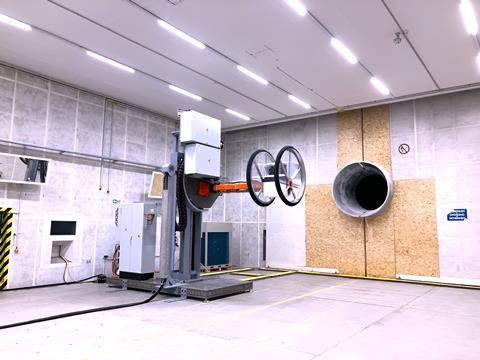Electric vertical take-off and landing (eVTOL) developer Lilium has completed the first series of tests for its jet propulsion units.
Bavaria-based Lilium said on 25 June that the engines were taken up to “maximum thrust” on a test bench, which is “an important step towards verifying safety of flight of the Lilium Jet,”. The company did not specify the maximum thrust reached.
“The tests performed have demonstrated the expected level of performance and reliability, bolstering Lilium’s confidence in the maturity of its electric jet propulsion system,” it says.

“Completion of the first engine test is a significant achievement for Lilium, demonstrating once again Lilium’s credentials as a world leader in the development of electric jet propulsion technology,” adds Stephen Vellacott, Lilium’s chief technology officer.
“We now move a step closer to first manned flight and beyond that to the era of commercial electric flight.”
Each Lilium Jet will have 30 of the ducted electric vectored-thrust engines – 18 on the wing and 12 on the forward canard. They are a single-stage design with a variable nozzle. The company has said that the Lilium Jet e-motor will each have a power density of over 100kW from a system weighing just over 4kg (8.8lb)
The German air taxi developer earlier this month reported “significant progress” on both fundraising as well as engineering milestones in the first quarter of 2024 as it spent €94.7 million ($102 million).
The company confirmed that it was still on track to launch piloted flight testing of its Lilium Jet “at the end of this year” and for entry into service by 2026.
“We have the next milestone, first piloted flight, firmly in our sights,” chief executive Klaus Roewe said on the airframer’s first-quarter investor call. “Our focus is on the delivery of key programme milestones such as the start of production of our aviation-grade battery packs achieved in April.”


























